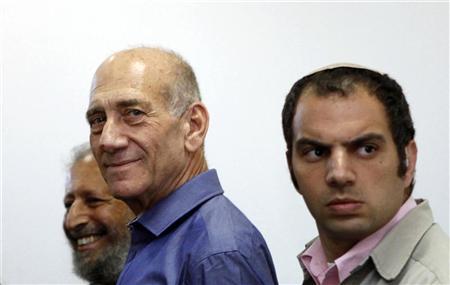
An Israeli court spared former Prime Minister Ehud Olmert a prison term for breach of trust on Monday, opening the door to a political comeback if he should want one.
Dogged by corruption scandals as he tried to forge a peace deal with the Palestinians, Olmert resigned in 2008. Though found guilty in July for approving projects that involved one of his long-time friends while in a previous cabinet post, he was acquitted of more serious bribery charges.
Jerusalem District Court handed Olmert a suspended one-year jail sentence and a 75,300 shekel (US$19,225) fine.
The three-judge panel also decided against defining the crime as one of "moral turpitude" — a label that, along with significant time behind bars, might have prevented the 66-year-old centrist politician from returning to public office.
"I leave court today walking tall," Olmert told reporters, without elaborating on his plans.
After his conviction, Olmert, who described himself as guilty of a "procedural irregularity" rather than corruption, said he had no intention of re-entering politics.
The party he once led, Kadima, now heads the opposition to Prime Minister Benjamin Netanyahu's rightist Likud. The next election is due in October 2013, though it could be brought forward over delays in passing the national budget.
Olmert is still fighting a separate bribery case over his role, as Jerusalem mayor from 1993 to 2003, in a controversial housing project. He has denied all wrongdoing in that case.
"This is not over," deputy Israeli state prosecutor Eli Abravanel said after Monday's sentencing.
Olmert voluntarily forfeited his government benefits as ex-premier after his conviction, which carried a maximum penalty of three years' imprisonment.
That gesture helped to soften his sentence, said the Jerusalem court, adding that it had also noted "the great contribution made by the defendant to the country."
The court's rejection in July of key accusations that effectively brought down a sitting prime minister, who was suffering prostate cancer at the time, raised questions in Israel about whether prosecutors had been overzealous.
But many Israelis soured on Olmert over the costly and inconclusive 2006 war against the Hezbollah militia in Lebanon.
An opinion poll conducted immediately after July's court verdict found 70 percent opposed to Olmert re-entering politics, with only 22 percent in favor.



